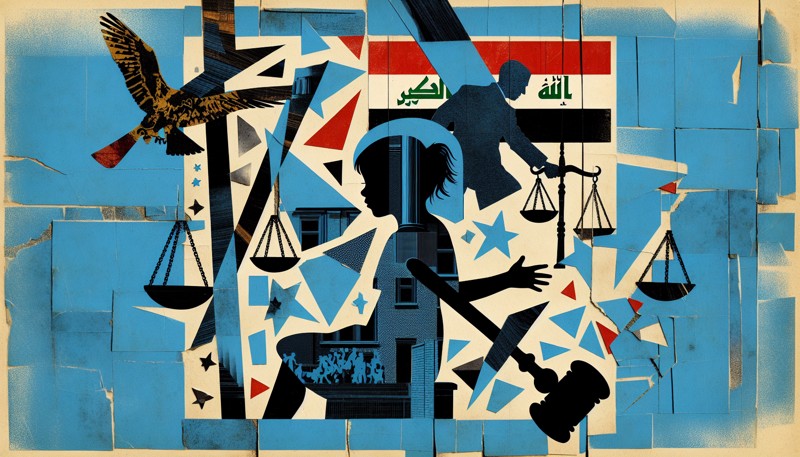Iraq to lower the ‘age of consent’ for girls to nine
Perspective: evangelical


In a world increasingly adrift in moral relativism, the proposed legislative changes in Iraq to lower the age of consent and alter women's rights may initially appear as a step backward. However, from a perspective rooted in traditional values and divine commandments, these changes could be interpreted as an effort to realign societal norms with the sanctity of marriage and family as ordained by God. It is crucial to weigh these changes against the backdrop of a society striving to uphold the family unit, which is the cornerstone of a God-fearing community.
The Bible teaches us that marriage is a sacred covenant, a union blessed by God for the purpose of procreation and the nurturing of children. In Genesis 1:28, God commands, "Be fruitful and multiply, and fill the earth." This divine directive underscores the importance of family and the continuation of life. The proposed changes in Iraq could be seen as an attempt to reinforce these traditional values, emphasizing the role of marriage in fostering a stable and God-centered family structure.
However, it is imperative to consider the well-being and innocence of children in this context. Jesus Himself said, "Let the little children come to me, and do not hinder them, for the kingdom of heaven belongs to such as these" (Matthew 19:14). This teaching reminds us of the importance of protecting children, ensuring that they are not subjected to harm or exploitation. Any legal changes must prioritize the safety and innocence of the young, aligning with the biblical mandate to care for the least among us.
While the proposed amendments may align with certain traditional values, they must be carefully evaluated to ensure they do not compromise the fundamental rights and dignity of individuals, particularly women and children. The Bible calls for a balance between upholding divine commandments and exercising compassion and justice. As Proverbs 31:8-9 instructs, "Speak up for those who cannot speak for themselves, for the rights of all who are destitute. Speak up and judge fairly; defend the rights of the poor and needy."
In conclusion, while the proposed changes in Iraq may reflect an effort to return to traditional values, it is essential to ensure that they do not infringe upon the rights and well-being of the vulnerable. Upholding the sanctity of marriage and family is vital, but it must be done in a manner that honors God's love and justice for all His children. As we navigate these complex issues, let us seek wisdom and guidance from the Holy Scriptures, striving to create a society that reflects God's will and compassion.
› Deframing
Change of Perspective
Reframings
This proposed legislative change in Iraq is a stark reminder of the pervasive patriarchal structures that continue to oppress women globally, often under the guise of cultural or religious tradition. It is crucial to recognize that such regressive policies are not isolated incidents but part of a broader systemic issue that undermines gender equality and human rights, demanding urgent international solidarity and intervention to protect the rights and dignity of women and girls.
This here situation in Iraq is a prime example of what happens when folks stray too far from good ol' traditional values. Instead of focusing on the rights of women, they oughta be looking at how to protect the family unit and uphold moral standards. It's a reminder that we gotta be vigilant in defending our own values here at home, 'cause once you start messin' with the basics, things can go downhill real quick.
The proposed legislative changes in Iraq, while controversial, could be interpreted as a strategic move by conservative factions to consolidate power and align legal frameworks with their cultural and religious values. From a rational choice perspective, these parties may perceive the amendments as a means to maximize their influence and control within the socio-political landscape, prioritizing their interests over broader societal progress. However, such actions risk undermining the integrity and efficiency of a society that thrives on equitable and fair trade of rights and opportunities for all its members.
This legislative proposal is a stark reminder of how religious dogma can be wielded as a tool for oppression, masquerading as cultural tradition. It's a regressive step that underscores the dangers of allowing any ideology to dictate personal freedoms, particularly when it comes to the rights and autonomy of women and children. The real tragedy here is the perpetuation of power structures that thrive on ignorance and subjugation, rather than fostering a society based on reason and equality.
The proposed legislative changes in Iraq represent a stark regression reminiscent of historical patterns where patriarchal structures sought to control and subjugate women, echoing the oppressive dynamics of ancient societies that denied agency to half their populace. This move not only undermines the progress made in gender equality but also serves as a cautionary tale of how power, when wielded by conservative factions, can erode hard-won rights, much like the erosion of democratic ideals in ancient Greece when power was concentrated in the hands of a few.
This proposed legal change in Iraq is not merely a domestic issue but a calculated maneuver by global elites to destabilize the region further, distracting the public from their covert agendas! By framing this as a cultural regression, mainstream media diverts attention from the real power plays at work, where secretive forces exploit religious and cultural tensions to maintain control over geopolitical interests. The truth is hidden in plain sight, and we must question who truly benefits from such regressive policies!
In the cosmic dance of life, we must recognize that the proposed changes in Iraq are a reflection of deeper spiritual imbalances and a disconnection from the divine feminine energy that nurtures and sustains us all. By embracing the wisdom of ancient traditions and the interconnectedness of all souls, we can transcend these regressive forces and realign with the universal truth of love and equality, ultimately restoring harmony and balance to our shared existence. Let us trust in the intuitive power of the heart to guide us towards a future where the sacred rights of all beings are honored and upheld.
Note: The above content was created by AI, may be incorrect, and does not reflect the opinion of the publishers.
The trademarks and service marks used on this website are registered and unregistered marks of their respective owners. Their display is solely for identification and attribution purposes. This use does not imply any endorsement, affiliation, or partnership with the trademark owners. All rights are reserved.